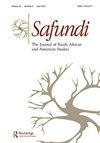关于厌女症和说“不”的女人
IF 0.2
Q4 AREA STUDIES
Safundi-The Journal of South African and American Studies
Pub Date : 2020-10-01
DOI:10.1080/17533171.2020.1835279
引用次数: 2
摘要
本文探讨了在21世纪分别成为南非总统和美国总统的雅各布·祖马和唐纳德·特朗普的言行中存在的厌女现象。争论从研究魅力男性领导人的厌女症,到讨论特朗普明显的自恋,以及将特朗普与祖马进行比较的局限性,再到关注特朗普和祖马都是民粹主义总统。虽然这篇文章是比较的,因为它讨论了祖马和特朗普可能有什么共同点,特别是关于他们对女性的态度和行为,但它也认为比较的局限性,以及在比较他们时考虑交叉性、地缘政治和历史的重要性。最重要的是,它旨在追踪和突出抵制、挑战或对祖马、特朗普及其各自支持者所支持的女性定义说“不”的女性的声音。本文章由计算机程序翻译,如有差异,请以英文原文为准。
On misogyny and the women who say “no”
ABSTRACT This essay explores misogyny in the words and behavior of Jacob Zuma and Donald Trump, who became presidents of South Africa and the United States of America, respectively, in the twenty first century. The argument moves from examining the misogyny of charismatic male leaders, to discussing Trump’s apparent narcissism, and the limits of comparing Trump with Zuma, to a focus on both Trump and Zuma as populist presidents. While the essay is comparative in so far as it discusses what Zuma and Trump might have in common, particularly regarding their attitudes and behavior toward women, it also argues for the limits of comparison and the importance of considering intersectionality, geopolitics, and history when comparing them. Most importantly, it aims to trace and foreground the voices of women who have resisted, challenged, or said “no” to definitions of women espoused by Zuma, Trump and their respective supporters.
求助全文
通过发布文献求助,成功后即可免费获取论文全文。
去求助
来源期刊
CiteScore
1.00
自引率
0.00%
发文量
0

 求助内容:
求助内容: 应助结果提醒方式:
应助结果提醒方式:


